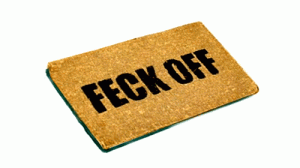It is a truth universally acknowledged, that an aging man in possession of a good intellect, must know that he gets more stupid by the year. The older one gets, the less one knows. There is so much I realize I don’t now that I seriously doubt any knowledge I think I do! This is regularly reinforced when I find that a word I thought I knew turns out to be totally wrong.
The Oxford University Press has a new blogger; Lauren Appelwick. In her inaugural blog, I asked her what her favorite three words are, to which she answered palimpsest, legit, and curdle. Now palimpsest is a word I know of, but not about. By that, I mean I sort of know that it’s a word, recall having heard it during my life, but not know what it means.
But what made seeing the word particularly irritating was that I could have sworn blind that the word was actually *palimpset. Honestly. Ironically, I had to check the OED itself to confirm my error – an error that has clearly been in my head for decades.
Another example of how little I know and how inaccurate what I think I know may be.
Palimpsest derives from the Latin palimpsestus, which refers to a piece of paper or parchment that has been written on again. In a sense, palimpsests represent an ancient form of recycling, where old writing would be removed from a parchment and new script added. Either that or a precursor to the Magic Slate or Etch A Sketch®.
Incidentally (and what’s a Word Guy article without an “incidentally”) the Etch a Sketch was invented in the late 1950’s by a Frenchman called Andre Cassagnes, an electrician by trade but a toy designer at heart. He developed a toy that he modeled on the shape of a TV screen, which used two knobs to move a pointer across a glass screen covered in aluminum dust. He called it the Telecran, itself derived from télévision and écran, the French for screen. Cassagnes took the toy to the International Toy Fair in Germany in 1959 under the name of L’Ecran Magique, where the Ohio Art Company took a look at it and promptly said “non!” Fortunately for the Cassagnes, the “non” became a “oui” on a deuxième viewing, and in 1960, the Etch A Sketch burst forth onto American TV screens and became a huge hit.
So thousands of years earlier, Hellenistic Greek had the word παλὶπφηστος meaning “scraped again,” which derived from Ancient Greek πὰλιν = again along with φηστός = to rub smooth. φηστός has the same Indo-European base as the Sanskrit bhas, which means “to crush, chew, or devour.”
In 1661, Robert Lovell mentions the palimpsest in his A compleat history of animals and minerals when he says, “The chalked skinne for a palimpsestus, serving in stead of a table book.” A full definition appeared in 1701 in Phillips’s New World of Words, Vol 6. as;
… a sort of Paper or Parchment, that was generally us’d for making the first draught of things, which might be wip’d out, and new wrote in the same Place.
It is also used to refer to brass plates that have been reused on the back
By the 19th century, the word had taken on extended meaning as “a thing likened to such a writing surface, esp. in having been reused or altered while still retaining traces of its earlier form; a multi-layered record.”
Palimpsest was used to described the brain (“What else than a natural and mighty palimpsest is the human brain?” – De Quincey, 1845); the soul (“Let who says ‘The soul’s a clean white paper’ rather say a palimpsest… defiled” – Browning, 1856); history (“All history was a palimpsest, scraped clean and re-inscribed exactly as often as was necessary” – Orwell, 1949); and even entire countries (“The absurdity and high emotion that characterises the palimpsest that is India” – The Times, 9 Mar., 1995).
At the beginning of the 20th century, the word was assimilated by the fields of physical geography and geology to specifically refer to structures that are characterized by superimposed features, produced at two or more distinct time periods. In 1914, an article by Taylor in the Geographic Journal contained the line “I explain the topography as follows (in accord with the ‘palimpsest’ theory)…”
The word can be used as an adjective to described things of a palimpsest nature, as evidenced by The Times in 2001:
They [sc. television reruns] are another manifestation of today’s palimpsest pop culture, in which everything is ripe for sampling and nothing stays dead.
By adding the “-ic” suffix, it’s possible to turn the adjective palimpsest to – the adjective palimpsestic! This is referred to as a pleonasm, the addition of a redundant morpheme or word. If I were pretentious, I might want to suggest that a pleonasm is a type of linguistic palimpsest: but I am not pretentious 😉
Hmm, it’s surprising that no-one at Rolling Stone has yet used the phrase “palimpsestic rap” or “palimpsestic dance remixes” – or maybe they have.
The word also exists as a verb, to palimpsest, but it sounds weird when you see it inflected in a sentence. For example, in Scribes and Scholars (1991), Reynolds and Wilson wrote “The toll of classical authors was very heavy: amongst those palimpsested we find Plautus and Terence, Cicero and Livy.” And in Gravity’s Rainbow (1973) Pynchon wrote, “Down both the man’s cheeks runs a terrible rash, palimpsested over older pockmarks.”
It’s hardly a popular verb. The Corpus of Contemporary American doesn’t have an example of palimpsested, palimpsests, or palimpsesting. Nor does the British National Corpus. Here’s an opportunity for wordies to start promoting
So now I know enough about the word palimpsest to feel temporarily content that in the infinite universe of things I don’t know, there’s at least one more word that I can be reasonably confident about. Until someone makes a comment…















